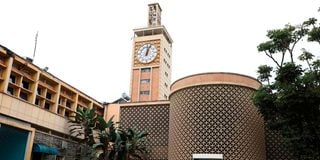Premium
Panic as audit reveals fake papers used to get jobs in Parliament

A section of Parliament Buildings, Nairobi.
An audit of papers submitted by individuals hired by Parliament last year has unearthed fake academic credentials.
Sources intimated to the Sunday Nation that by Thursday, those found by the human resources department to have submitted fake papers were two, but other sources said the number could be as high as 50, with the verification ongoing.
The mass employment was done by the Parliamentary Service Commission (PSC) last year and it saw more than 300 officers hired. Committee clerks, media relation officers, legal officers, security officers, secretaries, accountants, communication officers were among those hired and deployed in various departments.
“There was a requirement in the letter of offer that they will only be confirmed upon performance appraisal and verification of academic documents. This is what we are doing now,” said the source.
Regarding reports that the scrutiny is causing panic in Parliament, the source said this was an annual exercise. “The verification of the academic documents is done by the human resource department, while the performance appraisal is done by their seniors. So, we are waiting for the results.”
The exercise is expected to be concluded next week. It is not clear what action the PSC will take against those found to have forged their credentials. The Penal Code says: “Any person who forges any document or electronic record is guilty of an offence, which, unless otherwise stated, is a felony and he is liable, unless owing to the circumstances of the forgery or the nature of the thing forged some other punishment is provided, to imprisonment for three years.”
The Sunday Nation reached out to Jeremiah Nyegenye, the PSC secretary, for comment, but he referred us to National Assembly Speaker Moses Wetang’ula, who chairs the PSC. Mr Wetang’ula did not respond to our calls and text messages.
In November, Dr Juma Mukhwana, then the Kenya National Qualifications Authority director-general, told Parliament that about 30 percent of academic certificates in Kenya are either fake, falsified, or tampered with.
Mr Sekou Owino, the legal head at Nation Media Group, wrote in a column in June 2022 that the misrepresentation of qualifications, skills and education, besides exposing a person to criminal charges, often results in instant dismissal in the context of employment.





